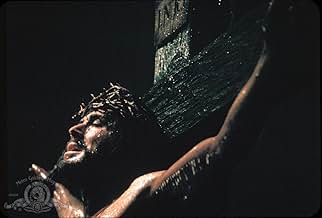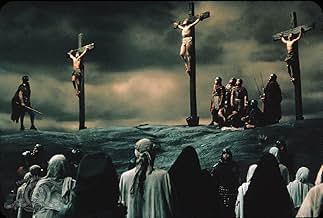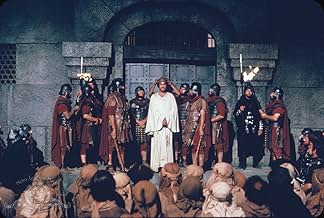AVALIAÇÃO DA IMDb
6,6/10
13 mil
SUA AVALIAÇÃO
Um filme épico que narra a vida e o ministério de Jesus Cristo.Um filme épico que narra a vida e o ministério de Jesus Cristo.Um filme épico que narra a vida e o ministério de Jesus Cristo.
- Direção
- Roteiristas
- Artistas
- Indicado a 5 Oscars
- 1 vitória e 6 indicações no total
Avaliações em destaque
Saw the cut-down version of this recently on cable, letterboxed (the only way to go!). For all the bad press it evidently got in its day, I found the color cinematography dazzling, the compositions wonderful (as we'd expect from the director of Shane and Giant), and the performances ... not too bad at all, for the most part. Many if not most of celebs who did cameos are no longer household names (or faces), so they're less jarring than they must have been in the 60s (the groaning exception, of course, being John Wayne as the Centurion). Von Sydow is fine if a bit stiff, Heston as the Baptist is a bit too stiff, Jose Ferrer is wonderful (did his son Miguel study dad's performance as Herod Antipas for his role in Traffic?), and so are most of the other key parts.
If Scorcese's Last Temptation of Christ comes off as less an art film and more as another corny Hollywood biblical epic, Stevens' film comes off less as the latter and more as the former, given that one's expectations are for corn, not art. (Is that clear?) I've said previously that Scorcese's film was basically a ripoff of Pasolini's wonderful Gospel According St Matthew, and I still think that's the case so far as the basic treatment goes, but I now think that visually, as a wide-screen color film, it rips off Stevens.
Greatest Story is the first Christ movie (and probably the first biblical epic) where the director obviously understood that the physical setting could be a very important part of the story - the sparse, barren landscape that people could disappear into and come back having seen visions, etc. Scorcese seems to have picked up on this too, but his visual sense isn't a jot on Stevens', for sure.
I do agree that the story drags, and the whole thing is probably overlong. I was also disappointed that Stevens does so little with the final temptation and betrayal in the Garden of Gethsemane. I've always felt this is the dramatic climax of the whole story - the final point of no return for Jesus - and oddly, the recent TV miniseries version, with Jeroen Krabbe as a fun modern-dress Satan, is the only one that's really grasped this, I think. Maybe some of this is among the stuff that didn't survive from the 260-minute version?
Overall, I'd heartily urge George Stevens Jr., who's done such a good job of preserving his father's legacy, to consider restoring this one and letting us see it on the big screen again. It's a feast.
If Scorcese's Last Temptation of Christ comes off as less an art film and more as another corny Hollywood biblical epic, Stevens' film comes off less as the latter and more as the former, given that one's expectations are for corn, not art. (Is that clear?) I've said previously that Scorcese's film was basically a ripoff of Pasolini's wonderful Gospel According St Matthew, and I still think that's the case so far as the basic treatment goes, but I now think that visually, as a wide-screen color film, it rips off Stevens.
Greatest Story is the first Christ movie (and probably the first biblical epic) where the director obviously understood that the physical setting could be a very important part of the story - the sparse, barren landscape that people could disappear into and come back having seen visions, etc. Scorcese seems to have picked up on this too, but his visual sense isn't a jot on Stevens', for sure.
I do agree that the story drags, and the whole thing is probably overlong. I was also disappointed that Stevens does so little with the final temptation and betrayal in the Garden of Gethsemane. I've always felt this is the dramatic climax of the whole story - the final point of no return for Jesus - and oddly, the recent TV miniseries version, with Jeroen Krabbe as a fun modern-dress Satan, is the only one that's really grasped this, I think. Maybe some of this is among the stuff that didn't survive from the 260-minute version?
Overall, I'd heartily urge George Stevens Jr., who's done such a good job of preserving his father's legacy, to consider restoring this one and letting us see it on the big screen again. It's a feast.
An often under-rated attempt at the life of Christ, George Stevens' modestly titled epic was long, beautifully photographed and more than a little deferential to our saviour but it managed to keep my interest. Most of the film's critics believe the incessant cameos ruin it - though I think the brash, mainly American contingent make quite an accurate portrayal of humanity opposite serene Swede Max von Sydow. And it is to Him the film belongs. His first english-language film & one he admits isn't a masterpiece is notable for a performance from a man who played Jesus as a man and not as a God. Whatever, he was so good he almost converted this hardened atheist.
One of films real special. For cast, off course, but, more important, for a fist of performances. Charlton Heston,Donald Pleasance, Telly Savalas are the good examples. Sure, the provocation is the option for Max von Sydow for the role of The Savior. It is not easy to say if the choice was a happy one, but his work is so special than you see it as reasonable choice. The scenes of the death and resurrection of Lazarus are, for me, the axis to remind this film. Like the cinematography andthe opportunity to see Grand Canyon in different perspective.A generous film and good alternative, today, to Zeffirelli and Gibson films about Christ. Because it remains a sort of exploration , honest, wise and precise of the great story root of our civilisation.
As someone who had read the Bible and knows what goes where, I am easily critical of too-Liberal Biblical movies, which is usually the case....except for the last 40-some years when hardly any films were made on this subject at all.
My point is that this film gets toasted a lot, even by Christians, and I think unfairly. Yes, I became a bit annoyed the first few viewings when I would hear Jesus' speeches way out of order, or a few other things that really weren't 100 percent on the mark....or it just simply dragged.
However, after a long absence and my first look at this on the ultra widescreen (2.75:1) DVD, I was impressed. For instance, the scene with the Last Supper shows everyone at the table, which is impossible to do in a formatted-to-TV mode. There are other similar panoramic shots that are very impressive. gave me a new appreciate of the work director George Stevens did here. Of course, he was one of the best in his profession so it's no surprise this is nicely filmed.
Upon that recent viewing, I was please that none of Jesus' quotes are inaccurate and I have never had a problem with Max Von Sydow's portrayal of Christ. He had a penetrating eyes and spoke his lines with authority. Why he, too, gets bashed by a few people is unfair. He was just fine.
It's a sanitized message, nothing that "preachy" to turn off the unchurched, but I do think it was a bit too slow to go three hours and 20 minutes. In this case, lopping off 15-30 minutes might have helped. It's still worth viewing, no matter what your "religious" views.
My point is that this film gets toasted a lot, even by Christians, and I think unfairly. Yes, I became a bit annoyed the first few viewings when I would hear Jesus' speeches way out of order, or a few other things that really weren't 100 percent on the mark....or it just simply dragged.
However, after a long absence and my first look at this on the ultra widescreen (2.75:1) DVD, I was impressed. For instance, the scene with the Last Supper shows everyone at the table, which is impossible to do in a formatted-to-TV mode. There are other similar panoramic shots that are very impressive. gave me a new appreciate of the work director George Stevens did here. Of course, he was one of the best in his profession so it's no surprise this is nicely filmed.
Upon that recent viewing, I was please that none of Jesus' quotes are inaccurate and I have never had a problem with Max Von Sydow's portrayal of Christ. He had a penetrating eyes and spoke his lines with authority. Why he, too, gets bashed by a few people is unfair. He was just fine.
It's a sanitized message, nothing that "preachy" to turn off the unchurched, but I do think it was a bit too slow to go three hours and 20 minutes. In this case, lopping off 15-30 minutes might have helped. It's still worth viewing, no matter what your "religious" views.
On 9/18/00 I received a letter from George Stevens, Jr., replying to my earlier letter to him encouraging his support of his father's four-hour, "uncut," version of "The Greatest Story Ever Told" preparing for dvd. I had suggested in my letter that the original version was undoubtedly his father's artistic vision and thus was the one worthy of preservation for dvd.
Stevens, Jr. responded, in part, " . . . the dvd of 'The Greatest Story Even Told' is underway and MGM-UA has found the original negative of the four-hour version of the film.
There has been a good deal of confusion about the 'official' version of 'The Greatest Story Ever Told.' In recent years I became satisfied that the 3 hour and 20 minute version was the one that my father considered his picture. That came as a result of conversations with Toni Vellani, who worked with my father and has since passed on, and others.
My father, according to Toni, rushed the film for its first two premieres and immediately, at his own initiative, started trimming it to the 3:15 version. He was pleased with this cut. . . .
There was a later shorter version that my father authorized UA to make in an effort to recoup some money -- and that version which ran under 3 hours is of no value at all.
Frankly, I will be interested to see what the additional 40 minutes represents in the long version because, over the years, I've been familiar with the version that runs approximately 3:15. . . ."
This generous explanation from Mr. Stevens, Jr. certainly reveals the intracacies of the purely artistic process as balanced with the business aspect. It also makes one aware that the assumption that the "cut" version was not the preference or the adequate representation of the director, may be inaccurate. In any event at this point, the four-hour dvd version of "The Greatest Story Ever Told" is most eagerly awaited.
Stevens, Jr. responded, in part, " . . . the dvd of 'The Greatest Story Even Told' is underway and MGM-UA has found the original negative of the four-hour version of the film.
There has been a good deal of confusion about the 'official' version of 'The Greatest Story Ever Told.' In recent years I became satisfied that the 3 hour and 20 minute version was the one that my father considered his picture. That came as a result of conversations with Toni Vellani, who worked with my father and has since passed on, and others.
My father, according to Toni, rushed the film for its first two premieres and immediately, at his own initiative, started trimming it to the 3:15 version. He was pleased with this cut. . . .
There was a later shorter version that my father authorized UA to make in an effort to recoup some money -- and that version which ran under 3 hours is of no value at all.
Frankly, I will be interested to see what the additional 40 minutes represents in the long version because, over the years, I've been familiar with the version that runs approximately 3:15. . . ."
This generous explanation from Mr. Stevens, Jr. certainly reveals the intracacies of the purely artistic process as balanced with the business aspect. It also makes one aware that the assumption that the "cut" version was not the preference or the adequate representation of the director, may be inaccurate. In any event at this point, the four-hour dvd version of "The Greatest Story Ever Told" is most eagerly awaited.
Você sabia?
- CuriosidadesGeorge Stevens was under pressure to hurry the John the Baptist sequence, which was shot at the Glen Canyon area. It was scheduled to become Lake Powell with the completion of the Glen Canyon Dam, and the production held up the project.
- Erros de gravaçãoThroughout the film there are shots of snow on the ground and snow on the mountains of Utah. Israel rarely gets any snow.
- Citações
Jesus: Do not weep for me; weep for yourselves, and for your children. For a time is coming when men will say "blessed are the barren, the wombs that never bore a child." And they will say to the mountains "fall on us," and to the hills "cover us," for if these things are done when the wood is green, what will happen when it is dry?
- Versões alternativasOriginal Cinerama version ran 260 minutes, subsequently cut over the years. The shortest version runs 141 minutes. Numerous versions have been shown on television. Network television print has only the main cast credits at the beginning and the technical credits at the end shown page-by-page (not "rolled up" as most prints), including a credit for "Cinerama". The most common version of the film shown today and in the home media releases are the 195 minute cut and the 199 minute roadshow version with all the credits rolled up at the beginning and the end titles showing the words "A George Stevens Production" and "Released through United Artists". The 195 minute cut has been seen on cable TV.
Principais escolhas
Faça login para avaliar e ver a lista de recomendações personalizadas
- How long is The Greatest Story Ever Told?Fornecido pela Alexa
Detalhes
Bilheteria
- Orçamento
- US$ 20.000.000 (estimativa)
- Tempo de duração4 horas 20 minutos
Contribua para esta página
Sugerir uma alteração ou adicionar conteúdo ausente

Principal brecha
What is the streaming release date of A Maior História de Todos os Tempos (1965) in Australia?
Responda
























